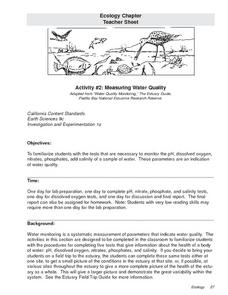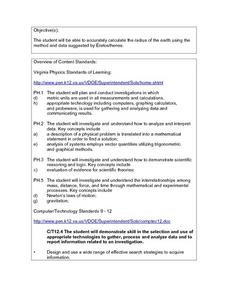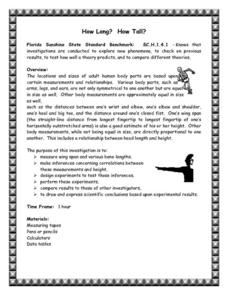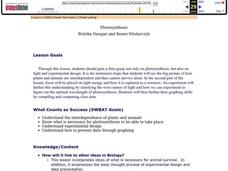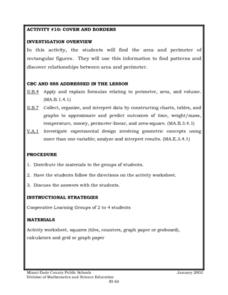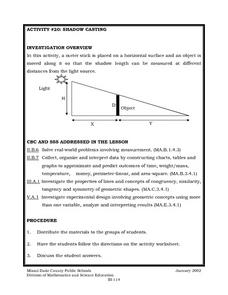Curated OER
Testing the Hypothesis
Students create and conduct various experiments to determine the origin of a family artifact, and then determine whether their results were successful. Students summarize their results and evaluate whether their hypotheses were correct.
Curated OER
A Tasty Experiment
Students work together to determine if smell is important to being able to recongize food by taste. They try different foods with different textures and hold their nose. They create a graph of their results.
Curated OER
Electric Current and Resistance
Students are introduced to the topics of electric currents and resistance. In groups, they distinguish the difference between conventional and electron flows and state Ohm's Law for electrical components. They calculate the resistance of...
Curated OER
The Drag of Drag
Students are introduced to drag. Then they summarize drag by saying that the drag is proportional to the square of the velocity. Students then solve problems an example of such a problem: Explain why swimming underwater is faster than...
Curated OER
Steller Web Spinning Mystery
Young scholars investigate what a system is in the scientific world. They watch a video of the Stellar seals of Alaska and develop clues as to why the seals are leaving. They discover through the clues they discover, how the components...
Curated OER
Measuring Water Quality
Students are introduced to the various methods of measuring water quality. In groups, they test various water samples using the different methods, writing them down for pH, oxygen, salinity, and nitrate levels. They use their data to...
Curated OER
Can You Calculate the Speed of Your Pet?
Students analyze the formula for speed and velocity. They explore and demonstrate how to calculate the speed of wind up toy pets, average the speeds and identify the correct units of measure of speed.
Curated OER
The Story of the Transistor
Students brainstorm on how certain items have become smaller as technology advances. They watch a video about the history of the transistor.
Curated OER
Looking into Eratosthenes' Radius of the Earth
Young scholars, in small groups, research Eratosthenes and his calculations of the Earth's radius. They write a summary of the person, the experiments and his calculations to determine how accurate Eratosthenes was in his estimations of...
Curated OER
Researching Alternative Energy
Sixth graders investigate the concept of energy using a hypothetical story. The power goes out in their house and they no longer can play your videogames. Students must create your own alternative power source. This story sets the stage...
Curated OER
Investigating the Uses of Backyard Bacteria
Students discover that the answers to some of society's waste and clean-up problems may be no further than the soil beneath their feet. They perform a Gram stain on the colonies to determine some of their characteristics.
Curated OER
SEPARATION OF A STARCH-GLUCOSE MIXTURE USING GEL FILTRATION
Students make a starch-glucose solution and pour it through gel in order to separate the starch from the glucose. They examine how starch is a larger molecule than glucose and test for the presence of these substances using other...
Curated OER
Plant Biotechnology: Controlling Tissue Differentiation
Students demonstrate hormonal control of plant tissue differentiation and relate this differentiation to gene expression. They explore the effects of hormones (auxin and cytokinin) on the genes that control tissue differentiation in callus.
Curated OER
Plant Biotechnology: Controlling Tissue Differentation
Young scholars demonstrate skills of biotechnology stringent aseptic technique and statistical analysis. They describe hormonal control of plant tissue differentiation and relate this to gene expression. Students observe the effects of...
Curated OER
Separating a Starch-Glucose Mixture Using Gel Filtration
High schoolers experiment using the basic principles of gel filtration. They use the gel filtration technique for testing for the presence of specific substances. Students discover that starch is a larger molecule than glucose.
Curated OER
How Long? How Tall?
Seventh graders investigate the parts of the human body and examine the symmetry of body parts like arms and legs. They measure the body parts and take individual height and weight to compare the quantities. Student examine whether the...
Curated OER
Photosynthesis
Students recognize the importance of plants as they perform an experiment involving photosynthesis. Students determine the optimum wavelength of light for photosynthesis by exposing plants to different colors of light, collecting data,...
Curated OER
The UPS Experiment
Students calculate the speed using metric measurements. In this geometry lesson, students calculate speed, distance and velocity using metric measurements. They gain inquiry and problem solving skills in this assignment.
Curated OER
Earth Day Lessons With The Right Stuff
Earth Day lessons provide a great way to teach students about the significance of the event, and how they can make a difference.
Curated OER
Cover and Boarders
Pupils find the area and perimeter of rectangular figures. They use this information to find patterns and discover relationships between area and perimeter. Students apply and explain formulas relating to perimeter, area, and volume.
Curated OER
Shadow Casting
Eighth graders use a meter stick that is placed on a horizontal surface and an object is moved along it so that the shadow length can be measured at different distances from the light source. They solve real-world problems involving...
Teach Engineering
Physics Tug of War
Slide books with a little assistance from Newton. Using books, groups create a demonstration of Newton's Second Law of motion. Pupils compare the distance traveled by one and two books when they apply a force to them.
Teach Engineering
Energy and the Pogo Stick
Let your class bounce to examine the concept elastic potential energy. Individuals bounce on a pogo stick in order to calculate its elastic potential energy. Groups then compare the elastic potential energy to the gravitational potential...
Teach Engineering
Energy on a Roller Coaster
Roll with your class into the idea of conservation of energy. Pupils use a roller coaster track to collect data to reinforce the concept of conservation of energy and the influence of friction. Class members then create a graph from...







